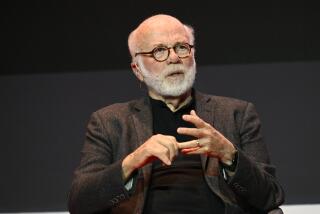Can the HMOs Now Retreat From the Cheney Standard?
- Share via
The medical saga of Vice President Dick Cheney demonstrates the remarkable progress in U.S. cardiovascular care over the past three decades. Implantable cardioverter defibrillators, like the one in Cheney, can successfully shock a damaged heart back to regular rhythm in eight seconds or so if a lethal rhythm begins.
A daily quandary for the cardiologist is in whom to implant such devices, as they are expensive ($30,000) and the indications about whom they will most help are quickly evolving. The Cheney case speaks volumes about physician judgment and patient access to therapy.
While ICDs have been around for 20 years, there still is only one clinical trial that speaks directly to Cheney’s situation. It shows that ICDs improve survival in patients with heart conditions similar to Cheney’s if used as a preventive tool. The recommendation of an ICD for Cheney is light years beyond what is being done in the general medical community. Of the 40,000 new ICDs implanted in the U.S. annually, almost all are for patients who have already been resuscitated after a cardiac arrest. Only 5% to 10% now are for the preventive indications used in the Cheney case.
It helps to be a high profile patient. Cheney had his problem identified and was in the hospital the next weekend. Where was the primary care physician in the decision-making process, unless it was the widely quoted chief of medicine at George Washington University Hospital? Was there a managed care official involved, or was President Bush standing in for the HMO when he said that he thought the procedure was a good idea?
In California, a patient like Cheney might be referred to a specialist. Then the struggle would begin with the managed care provider for approval to implant an ICD. No quick Saturday implant in Los Angeles. Rather, the treatment request would go to a procedure approval system that is slow, arbitrary and designed to postpone or prevent care. If such a patient (with Cheney’s indications) is uninsured, forget it: The only way such a patient would receive an ICD is if the hospital and physicians donate the entire cost.
So, the well-informed physicians caring for Cheney may have performed a minor miracle. They have helped ensure that a very productive human being will not die suddenly but will be able to serve out his term of office. But they also have made it more possible for other deserving patients to receive similar care. Perhaps primary care doctors will be more aware of the important role of ICDs for high-risk patients like Cheney. And it will be difficult for insurance plans to turn down treatment requests for similar patients.
Enabling high-risk cardiovascular patients such as Cheney to be treated in the right way medically may be one of the major accomplishments of the Bush administration. Is the “Cheney standard” for health care now generally accepted for all patients? I hope so, It is this kind of medicine that most of us went to medical school to practice.
More to Read
Get the L.A. Times Politics newsletter
Deeply reported insights into legislation, politics and policy from Sacramento, Washington and beyond. In your inbox twice per week.
You may occasionally receive promotional content from the Los Angeles Times.










